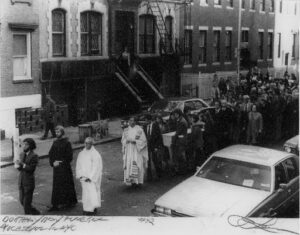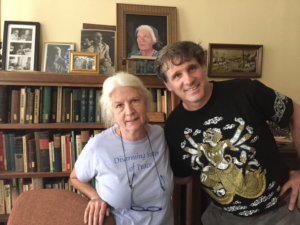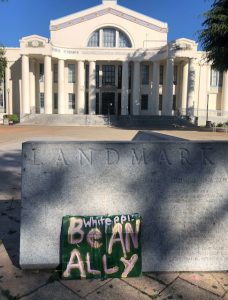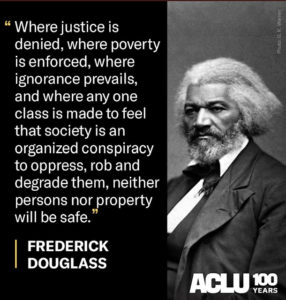oppressed
As we are loved.
December 25, 2020“A new commandment I give to you, the you love one another, even as I have loved you, that you also love one another.”
-Jesus of Nazareth, John 13:34
~
‘I know why I celebrate the Christian message. It is because I am grateful for what I have learned from Jesus: to be courageous and dare to question the established ways of thinking;
to speak up about unjust laws;
to be fearlessly compassionate;
to reach out to those who are sick and suffering; to attend to my short-comings before judging others for theirs; to be empathetic and reach across tribal boundaries to embrace people of all kinds, even those who are traditionally thought of as enemies; to have personal dignity under stress and
not buckle under the weight of popular opinion;
to be true to myself when the masses disapprove; to be charitable and stand for forgiveness and help those who are disproportionately disadvantaged; to be down to Earth about my spirituality and to practice it; and above all, to have a direct and personal relationship with the Divine.’
-Rev. Dr. Edward Viljoen
~
I, the father of this universe, the Mother, {GAIA, Sofia, Bafflement}, the Supporter, the Grandsire, the Holy One to be know, the Wood of Power.’ -The Bhagavad Gita
The Tao produced One; One produced Two; Two produced Three; Three produced All things. -Tao Te Ching
In a moment of realness, the clouds in our mind clear and our passion is restored, and our walls crumble when no one is looking. It all continues and refreshes, if we let it. It all renews so subtly. -Mark Nepo
“Behold, I make all things new.”
☆☆•*¨*•.¸¸
Dorothy Day.
November 23, 2020With author David Brooks & publisher Robert Ellsberg.
“In anticipation of our upcoming commemoration of the the 40th anniversary of Day’s death on November 29th 2020, we remember the eulogy given by Father Geoffrey B. Gneuhs, O.P. at the funeral of Dorothy Day, Nativity Church, New York City, December 2, 1980:”
In her book The Long Loneliness, Dorothy wrote, “All my life I have been haunted by God.” And where did this haunting God lead her? To a life of simplicity and poverty with the poor, to solidarity with the outcasts—today in this city of New York there are more and more people homeless as mental hospitals close and social services are cut back, while at the same time this country spends $170 billion a year for armaments.
This haunting God led Dorothy to jail because
she spoke and acted for the rights of women and men, of laborers and workers; she was led to jail because she stood with the farm workers, and to prison because she would not tolerate the militarist posture of this country. She was led ultimately to community, to love.
This being haunted by God became for her a stupendous and extraordinary pilgrimage, a pilgrimage of faith. For sure, the Sermon on the Mount sums up the entire life and spirit of Jesus, and it is an invitation which Dorothy with consummate conviction accepted. She realized that love is an exchange of gifts: the gift of faith, and she in turn offered the gift of her life lived in faith, given for us and thousands of others. The Sermon on the Mount, along with the 25th chapter of St. Matthew, the cornerstone of the Catholic Worker movement, is not some general guide or optional outline. It is the very expression of the flesh and blood of Jesus—the Incarnation of Truth.
In our country, those who have so much, too much, are apt to declare “Well, the poor you’ll always have with you”—not realizing or hearing Jesus speak the Truth in the Sermon, not hearing the Truth call out. That is precisely the point. Christ the poor one is always with us!
Dorothy, with dear Peter Maurin, of whom she wrote, “He was my master and I was his disciple, he gave me a way of life,” realized this Truth so well. She said, “What a simplification of life it would be if we saw Christ everywhere we go.” Did you give me clothes? Did you give me food? Did you give me shelter in the empty room in your home, of your rectory or priory?
To love, for her, was not a duty but a privilege. And should it not be for all of us? It begs the question: Do we want to meet Christ? Do we really believe? We do not have to go far to see Christ, to invite Christ, and to be invited by Christ. The invitation is offered for loaves and fishes, more often at our houses, soup and bread and tea. To those of us who doubt, to us Christians who waver, Dorothy showed by her love that, yes, the Gospel is possible. The Gospel is so possible it is now and cannot wait for the future. The moment is ours. Dorothy seized the moment given her. The Truth called her forth and she accepted the invitation—solidarity with those without the arrogance and dominance of wealth, power, and prestige. She lived the Truth with all its starkness and abruptness, with all its freedom and its love.
She wrote, “We cannot love God unless we love each other and to love we must know each other—and we will know Him in the breaking of the bread—and then we are not alone anymore. Heaven is a banquet and life is a banquet too, even with a crust, where there is companionship.” Love is not meant to be a half measure, nor is it meant to be easy. Dorothy on her pilgrimage knew that violence and war are not the way of Christ, that love is the only measure. Thus Truth again called her forth and she accepted the invitation to speak out against war and the crucifixion of humanity by nuclear armaments.
Wouldn’t it be a tragedy for us to equivocate or to dilute the spirit of her life?
She was utterly convinced of the rightness of pacifism and of nonviolent resistance to statism. And never, even at age 83, did she waver in the clarity of her vision of Truth and in her conviction.
Today the romance of war and power and individualism ignores the capacity of the human imagination imaged in God to see and to live the Gospel of gentle personalism and unconditional love. And Dorothy loved life, believed in life, enjoyed life. It was the very life of a child that welled up in her the invitation to the pilgrimage. In St. John’s Gospel, Jesus says, “I have come to bring life, to bring life more abundantly.”
Remember when Jesus was on trial for his actions of Truth? He said to Pilate, “Mine is not a kingdom of this world. If my kingdom were of this world, my men would have fought…. I came into the world for this: to bear witness to the truth and all who are on the side of truth listen to my voice.”
And what was Pilate’s reply? “Truth,” he said, “what is truth?” In a truthless world, some have struggled to listen to His voice and to continue to speak Truth—the Truth of Christ. And one was Dorothy: in her commitment to justice, to freedom and to peace, her resistance to the kingdoms of this world, and her unflinching commitment to the belief that love will redeem the world, Dorothy had a dream of this Truth, the dream became a vision, and the vision became a light for the world. The Truth guided her pilgrimage and she admitted, “We confess to being fools and wish that we were more so.” Oh, thank God for such foolishness!
And so Dorothy, the pilgrimage is over. You’re home now. The Truth invites you to the eternal banquet.
Dorothy Day’s granddaughter sentenced to prison for nuclear base break-in
Martha Hennessy, a granddaughter of Dorothy Day, the founder of the Catholic Worker movement, was sentenced Friday (Nov. 13) to 10 months in prison for breaking into Kings Bay Naval Base in Georgia two years ago to protest its stockpile of nuclear weapons.
Hennessy’s was the lightest sentence given for the break-in at the Navy base 40 miles south of Brunswick, Georgia, on April 4, 2018, in which Hennessy, 65, was joined by six other Catholic pacifists. Together they are known as the Kings Bay Plowshares 7, named after the Plowshares anti-war movement founded 40 years ago by Daniel and Philip Berrigan and six others.
On Thursday, Carmen Trotta, of St. Joseph Catholic Worker in New York City, was sentenced to 14 months in prison, while Clare Grady of the Ithaca Catholic Worker was sentenced to 12 months. Both have spent their lives at Catholic Worker houses in New York state, which house and feed the needy. All were also sentenced to probation and will be required to repay the Navy base a total of $33,500 in damages.
Hennessy is the only one of Dorothy Day’s nine grandchildren to dedicate herself to what Catholics call “works of mercy.”
Hennessy — in a statement right before her sentencing — said she regarded the action as a religious exercise, likening it to Jesus’ action of overturning the money-changing tables at the entrance to the Jerusalem Temple, as described in the New Testament gospels.
“I had no criminal intent,” she said. “I wanted to prevent a nuclear holocaust.”
We stand with you.
June 4, 2020[Photo: Courtney Martin, Oakland, CA]
♡
“We stand there with those whose dignity has been denied. We locate ourselves with the poor and the powerless and the voiceless. At the edges, we join the easily despised and the readily left out. We stand with the demonized so that the demonizing will stop. We situate ourselves right next to the disposable so that the day will come when we stop throwing people away. The prophet Habakkuk writes, “The vision still has its time, presses onto fulfillment and it will not disappoint . . . and if it delays, wait for it [2:3].”
-Fr Richard Rohr, Center for Action & Contemplation
What could better look like?
February 20, 2020One thing leads to another.
-Judge J. Edward Lumbard
❦
America is not some finished work or failed project but an ongoing experiment.
If parts of the machine are broken, then the responsibility of citizens is to fix the machine, not throw it away.
Our imperfections can, and out to, draw us together in humility, realism, patience, and determination.
No one has a monopoly on wisdom or is free from error. Everyone benefits from understanding other points of view.
The foundational virtue of democracy is trust, not trust in one’s own rectitude or opinion, but rust in the capacity of collective deliberation to move us forward.
To often we define our real national challenges–climate change, immigration, health care, guns–in a way that guarantees division into warring camps.
Instead we should be asking one another: What could “better” look like?
Our Founders thought in centuries.
Abraham Lincoln warned that the greater danger to the nation came from within. All the armies of the world could not crush us, he maintained, but we could still “die by suicide.”
-James Mattis, a former secretary of defense who served for more than four decades as a Marine infantry officer.
George Washington:
“Sooner or later the chief of some prevailing faction, more able or more fortunate than his competitors, turns disposition to the purposes of his own elevation on the ruins of public liberty.”
If we want our democracy to succeed, indeed, if we want the idea of democracy to regain respect in an age when dissatisfaction with democracies is rising, we’ll need to understand the many ways in which today’s [various] platforms create conditions that may be hostile to democracy’s success. And then we’ll have to take decisive action to improve.
-Social Psychologist Jonathan Haidt and technoethicist Tobias Rose-Stockwell
Paulo Freire
November 18, 2016Only with everyone filling his or her own political space to the point of civil disobedience as necessary, will empowerment mean anything revolutionary.







